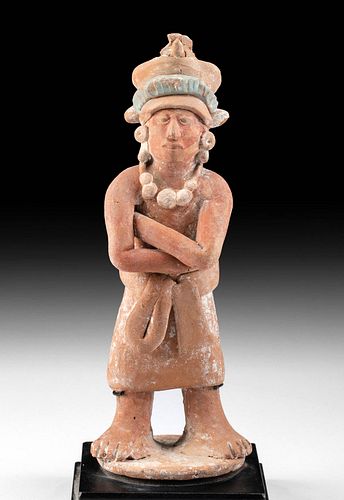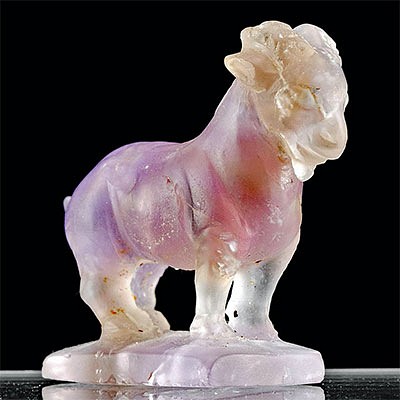Maya Jaina Pottery Standing Dignitary Figure w/ TL
Lot 79
About Seller
Artemis Gallery
686 S Taylor Ave, Ste 106
Louisville, CO 80027
United States
Selling antiquities, ancient and ethnographic art online since 1993, Artemis Gallery specializes in Classical Antiquities (Egyptian, Greek, Roman, Near Eastern), Asian, Pre-Columbian, African / Tribal / Oceanographic art. Our extensive inventory includes pottery, stone, metal, wood, glass and textil...Read more
Categories
Estimate:
$4,000 - $6,000
Absentee vs Live bid
Two ways to bid:
- Leave a max absentee bid and the platform will bid on your behalf up to your maximum bid during the live auction.
- Bid live during the auction and your bids will be submitted real-time to the auctioneer.
Bid Increments
| Price | Bid Increment |
|---|---|
| $0 | $25 |
| $300 | $50 |
| $1,000 | $100 |
| $2,000 | $250 |
| $5,000 | $500 |
| $10,000 | $1,000 |
| $20,000 | $2,500 |
| $50,000 | $5,000 |
| $100,000 | $10,000 |
| $200,000 | $20,000 |
About Auction
By Artemis Gallery
Dec 2, 2021
Set Reminder
2021-12-02 10:00:00
2021-12-02 10:00:00
America/New_York
Bidsquare
Bidsquare : Fine Antiquities | Asian | Ethnographic Art
https://www.bidsquare.com/auctions/artemis-gallery/fine-antiquities-asian-ethnographic-art-7918
Features classical antiquities, ancient and ethnographic art from cultures encompassing the globe. Egyptian, Greek, Roman, Etruscan, Near Eastern, Asian, Pre-Columbian, Native American, African / Tribal, Oceanic, Spanish Colonial, Russian, Fine / Visual Arts, so much more! Artemis Gallery info@artemisgallery.com
Features classical antiquities, ancient and ethnographic art from cultures encompassing the globe. Egyptian, Greek, Roman, Etruscan, Near Eastern, Asian, Pre-Columbian, Native American, African / Tribal, Oceanic, Spanish Colonial, Russian, Fine / Visual Arts, so much more! Artemis Gallery info@artemisgallery.com
- Lot Description
Pre-Columbian, Gulf Coast of Mexico, Western Yucatan Peninsula, Jaina/Campeche, Maya, Late Classic Period, ca. 550 to 900 CE. A gorgeous and hand-built pottery burial figure presenting a with dignified posture and standing with wide feet atop an integral circular plinth. The bold personage dons an ankle-length kilt that is knotted in the front with a wide belt and folds both arms atop a nude chest as if waiting for his attendees. The man is embellished with a large-beaded necklace and discoid earspools with teardrop-shaped ornamentation to further emphasize his importance and regality. Heavy-lidded eyes, a prominent nose, thin lips, and slightly concave cheeks comprise the stern countenance beneath a grand headdress with projecting upper elements and a powdery blue central fillet. A fantastic example of Jaina funerary artistry! Size: 2.375" W x 6.5" H (6 cm x 16.5 cm); 7.125" H (18.1 cm) on included custom stand.
Jaina figures, from an island off the Yucatan peninsula, are noted for their lifelike faces and their immense attention to detail. Scholars believe that sculptors modeled these figures' clothing on real clothing worn by the elite during the Late Classic Maya period. These figures likely represented actual people, were produced in Campeche, and then were brought to Jaina Island to be buried with the deceased. Fascinatingly, the people around Jaina are the only people in southeastern Mesoamerica who put human figures into graves. Everywhere else in the region, figures have been found solely in domestic contexts. The Spaniard Diego de Landa, who recorded details of Maya life shortly after the Spanish Conquest, wrote that the artists who created pieces like this one lived lives of religious isolation and ritual - fasting and abstaining.
This piece has been tested using thermoluminescence (TL) analysis and has been found to be ancient and of the period stated. A full report is available for purchase. Please inquire.
This piece has been searched against the Art Loss Register database and has been cleared. The Art Loss Register maintains the world’s largest database of stolen art, collectibles, and antiques.
Provenance: private Goldman Family collection, San Francisco, California, USA, acquired in 2006; ex-Heritage Auctions, Dallas, Texas, USA; ex-Stendahl Gallery, Los Angeles, California, USA
All items legal to buy/sell under U.S. Statute covering cultural patrimony Code 2600, CHAPTER 14, and are guaranteed to be as described or your money back.
A Certificate of Authenticity will accompany all winning bids.
PLEASE NOTE: Due to recent increases of shipments being seized by Australian & German customs (even for items with pre-UNESCO provenance), we will no longer ship most antiquities and ancient Chinese art to Australia & Germany. For categories of items that are acceptable to ship to Australia or Germany, please contact us directly or work with your local customs brokerage firm.
Display stands not described as included/custom in the item description are for photography purposes only and will not be included with the item upon shipping.
#164706Repair to back portion of integral plinth with small chips and light adhesive residue along break lines. Base is mostly restored. Losses to tips of some headdress elements as shown. Minor abrasions and encrustations to limbs, body, and head, with light fading to pigment. TL drill holes on back of right arm and beneath base.Condition
- Shipping Info
-
All shipping is handled in-house for your convenience. Your invoice from Artemis Gallery will include shipping calculation instructions. If in doubt, please inquire BEFORE bidding for estimated shipping costs for individual items.
-
- Buyer's Premium



 EUR
EUR CAD
CAD AUD
AUD GBP
GBP MXN
MXN HKD
HKD CNY
CNY MYR
MYR SEK
SEK SGD
SGD CHF
CHF THB
THB













